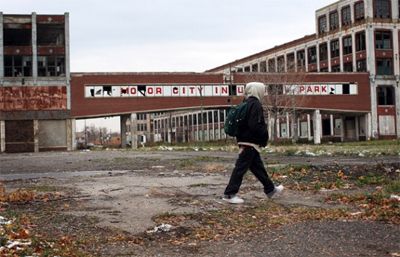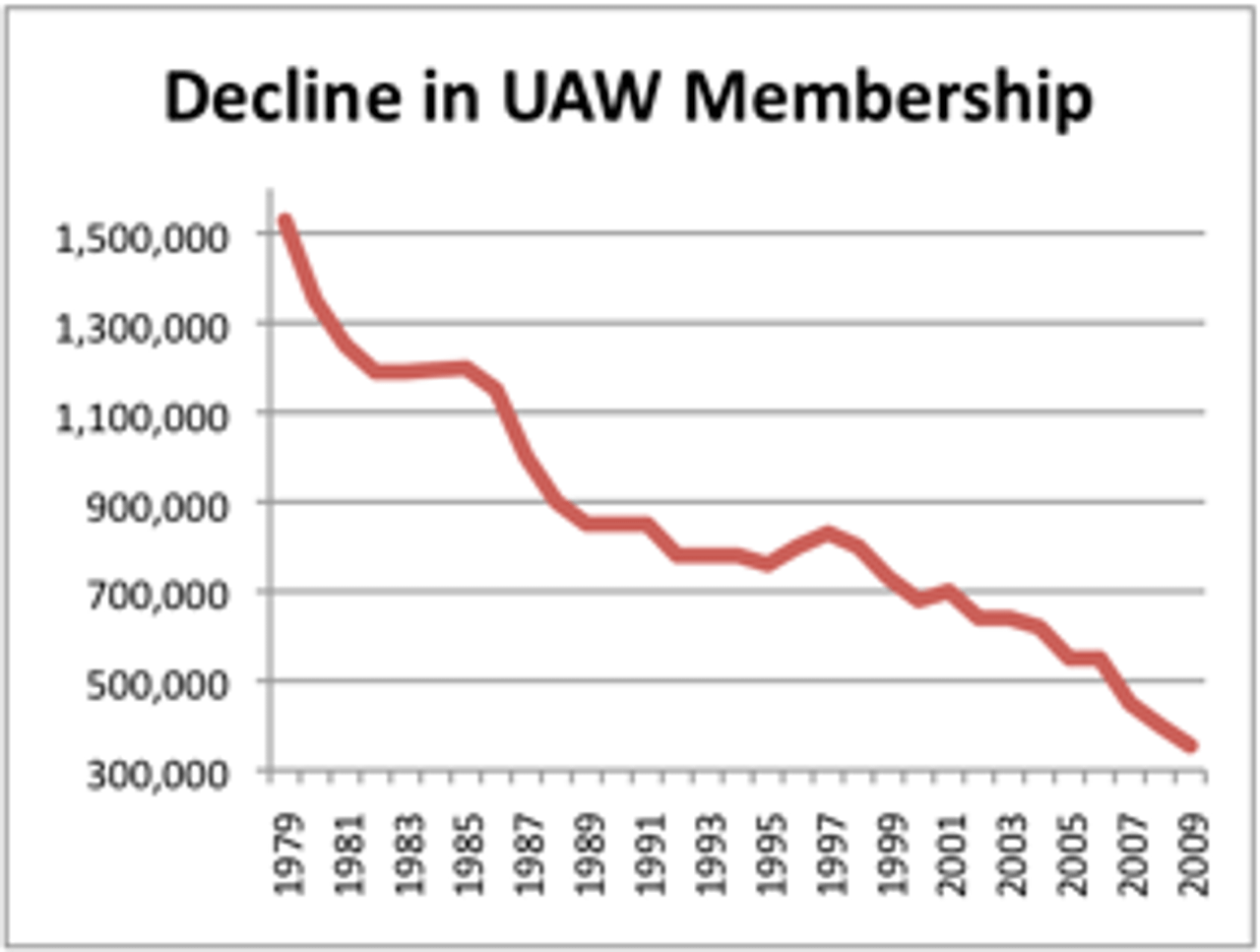General Discussion
Related: Editorials & Other Articles, Issue Forums, Alliance Forums, Region Forums''I don't see where the federal government is going to ride in here and give us a bucket of money.''
...said Detroit Mayor Dave Bing.
[font color="red"]I say: "Why the heck not?[/font color]
We only went to the moon -- granted 40 years ago today was the last moonshot, but still -- Hey! That had only been considered impossible for almost the entirety of human history. Why not get to fixing the mundane problems on earth?
Uncle Sam galloped full speed to bail out Wall Street, giving bonuses to the same people who stole, um, lost the money to begin with.

Background on image above: What the Packard Plant used to look like (plus unpleasant economic facts to know and share).
Background on Mayor Bing's statement:
Mayor Dave Bing responds to controversial call for federal money to help Detroit
By Khalil AlHajal | kalhajal@mlive.com
on December 07, 2012
DETROIT, MI -- The Drudge Report and other national media this week focused in on a comment made by City Council member JoAnn Watson calling for President Barack Obama to send some money Detroit's way.
"After the election of Jimmy Carter, the honorable Coleman Alexander Young, he went to Washington D.C. He came back with some bacon," Watson said during a Tuesday meeting.
SNIP...
Mayor Dave Bing, at the end of a press conference today in which he announced hundreds of upcoming city layoffs and addressed rumors of a possible state takeover and a managed bankruptcy, spoke on the idea of a federal bailout.
"I don't see where the federal government is going to ride in here and give us a bucket of money," Bing said. "I don't think that's going to happen.
"What they have done - The Obama Administration has been extremely supportive of this administration and the city of Detroit. I mean we've gotten money from them in a lot of different departments. We've gotten human resources from them. We've gotten really good support. But they've got to be careful, I think, because this is just one city in the United States and if they do something like that for us, everybody else is going to come with thier hands out. So they've got to be careful."
CONTINUED...
http://www.mlive.com/news/detroit/index.ssf/2012/12/mayor_dave_bing_responds_to_co.html
Trillions for the banksters. Zip for the people. If it weren't for Bernie Sanders, we wouldn't even know there was no controversy at all.
DJ13
(23,671 posts)That would end any problems about getting free money.
Octafish
(55,745 posts)We the People already are on the hook for $13.8 trillion to the banksters.
http://www.sourcewatch.org/index.php?title=Total_Wall_Street_Bailout_Cost
What's a few billion more per major city?
hack89
(39,181 posts)When you loose 60% of your population with no corresponding retraction in infrastructure then things like this happen. Not only are there fewer people but they are poorer.
Detroit is simply too big for its population.
The federal government should assist Detroit but in turn Detroit has to commit to downsizing and rationalizing city services and infrastructure.
Octafish
(55,745 posts)
UAW membership continues to plummet
Oh, well. Snyder's poised to sign legislation making Michigan a right-to-work state. I'm sure the jobs will be flying in real soon.
hack89
(39,181 posts)other rust belt cities have managed to diversify their economies - Pittsburgh comes to mind. Detroit had nothing when the US auto industry cratered.
Octafish
(55,745 posts)Here's a better perspective:
How the Press Helped Destroy the Auto Industry
Detroit’s Collapse: the Untold Story
by EAMONN FINGLETON
CounterPunch
For decades East Asian competition has played a controversial role in the decline of the American car industry. Both Japan and Korea have long been accused of unfair trade and closed markets. For their part Japanese and Korean officials have argued that their markets are open and that an incompetent and heedless Detroit doesn’t make the sort of cars their consumers want.
In all the charges and countercharges, little of the remarkable truth of Detroit’s trade problems has come out. To see how well — or rather how badly — you understand the background, try this quiz:
1. What was the Detroit companies’ share of the Japanese market in 1930? (a) About 90 per cent. (b) About 20 per cent. (c) Less than 4 per cent.
2. How many models do the Detroit corporations currently make with the steering wheel on the right (the standard configuration for Japan)? (a) More than 40. (b) 12. (c) 3.
3. What was the combined share of all foreign makers – American, European, and Japanese – in the Korean car market in the last decade? (a) Less than 2 per cent. (b) Around 15 per cent. (c) More than 70 per cent.
The correct answer in each case is (a).
If you flunked, don’t feel bad. Just cancel your newspaper subscription.
For decades American press coverage of global car industry competition has been abysmal. Reporters and commentators have almost never dug below the surface and their idea of fact checking has too often consisted merely of "accurately" recycling previous observers’ errors. Worse many commentators have displayed an almost venomously elitist bias against Detroit. In short, readers of the American press have been fed a diet of falsehoods, while key facts that give the lie to the foreign trade lobby’s special pleading have been swept under the carpet.
SNIP...
Protected Japan
No nation has benefited more from protectionism than Japan. In recent years, however, the fact that the Japanese car market remains as protected as ever has dropped off the American press’s radar. Although Japanese officials first proclaimed the market open as far back as the 1970s, as of 2008 the combined share of all foreign makers was still just 5 per cent. This was only a fraction more than in the 1980s and the second lowest in the developed world after only Korea. Apart from BMW and Mercedes-Benz, which have been allowed token market shares on condition that they pitch their prices nice and high (so they don’t spoil the game for the home team), every other foreign maker is shut out. Even Renault, which, via a stake in Nissan, ostensibly controls Japan’s second largest car distribution network, has never been able to get its cars into its own showrooms. (Why hasn’t Renault pressed harder for market access? As Renault executives have consistently ducked the question, CounterPunch put it to officials at the French embassy in Tokyo — and for good measure asked also why the Peugeot Citroen group’s cars are even less visible in Japan. Not entirely unexpectedly, the embassy never responded. Basically the French government is powerless to influence Japanese car trade policy but would rather not say so. And, as is well known in the Tokyo diplomatic community, any attempt to embarrass the Japanese establishment via public statements is viewed with vengeful disapproval by the Japanese establishment.
CONTINUED...
http://www.counterpunch.org/2009/07/03/detroit-s-collapse-the-untold-story/
Before cars, Detroit was an important center of transportation manufacturing. During WWII, Detroit was the arsenal of democracy. And in the times between, organized labor thrived here, giving birth to the middle class that once was the envy of the world.
Barack_America
(28,876 posts)Lop them off and leave them without a city, zip code or basic services?
hack89
(39,181 posts)build new, more compact neighborhoods and have them live there. Detroit could become a city of parks and greenways.
The feds can help them do that kind of planning.
Their tax base can't support their infrastructure. They need less infrastructure.
Octafish
(55,745 posts)Even to a 69-year-old Democratic mayor, the idea that the federal government exists to improve life for people in the cities appears as an alien concept. Everyone is supposed to know that's impossible, such is life after 32-plus years of Reaganomics.